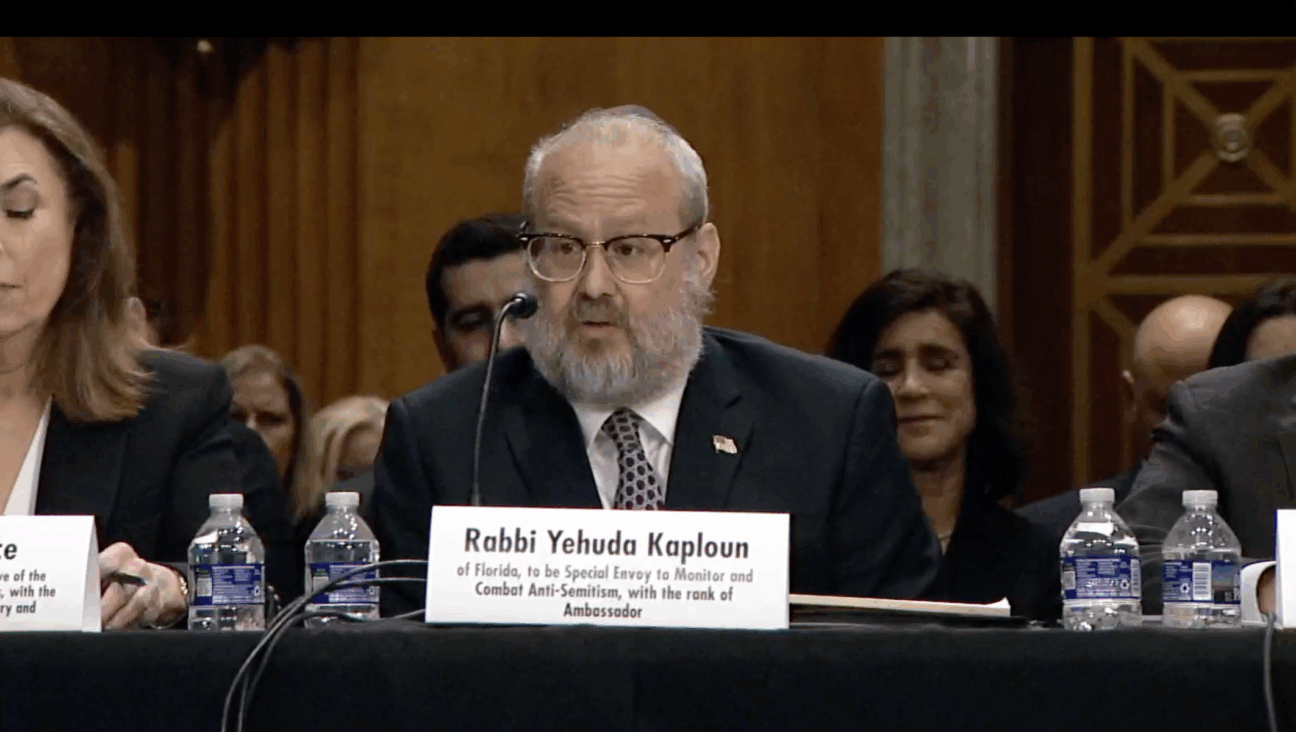Syria Makes Overture Over Negotiations
Worried about being diplomatically isolated by Middle East peace talks, Syria has signaled its willingness to enter into negotiations with Israel for the second time in recent months.
Syrian President Bashar Assad and Egyptian President Hosni Mubarak issued a joint communiqué Monday urging the United States, European Union, United Nations and Russia — the so-called Quartet backing the “road map” to peace — to push forward the Syrian-Lebanese tracks of the peace process.
In late April, faced with daily American accusations that it was harboring Iraqi officials and weapons, Syria used Democratic Rep. Tom Lantos of California to deliver a message to Israel proposing to reopen negotiations on all outstanding issues.
Then as now, Israel dismissed the move as a ploy by Damascus to avoid Washington’s ire over Syrian meddling in Iraq, its pursuit of weapons of mass destruction and its support of terrorist organizations.
President Moshe Katsav said Tuesday that while Israel was seeking peace agreements with Syria and Lebanon, Assad was an obstacle.
“Unfortunately, Syria’s president, by taking steps that are different to those of his father, is increasing the number of problems between us,” press reports quoted Katsav as saying during an official visit to Turkey.
In April, Prime Minister Sharon responded to Assad’s entreaties by saying that Israel was ready for “unconditional negotiations” with Syria, a code word meaning Israel was opposed to resuming negotiations at the point at which they ended in 2000 during the tenure of former prime minister Ehud Barak. Then, both sides were said to be close to an agreement, but they clashed over the delineation of the border near the Sea of Galilee.
During the past several months, top Israeli officials have warned their American counterparts and audiences about Assad’s unreliability. American officials have echoed the stance, and press reports have speculated about possible American military intervention in Syria. While American officials have denied such a possibility, the intimidation tactic has worried the Assad regime.
Assad reportedly asked Mubarak to help ease the growing tensions between Damascus and Washington, according to Egyptian officials quoted by The New York Times and the Egyptian semiofficial daily Al-Ahram.
“There is a great deal of pressure emanating from Riyadh, Cairo and Amman on Damascus, so with really no place to go, Assad has decided to be more cooperative,” said David Lesch, a Syria expert at Trinity University in San Antonio. “However, if the U.S. continues to get bogged down in Iraq and if the road map encounters some serious obstacles, you can look for Syria to be more reticent and bombastic because the pressure on Damascus would by default recede.”
Lesch noted that in addition to the effects of “warning shots” fired across the bow by Washington during the Iraq war, several European countries, in particular France, have told Syria in no uncertain terms that it needs to improve its behavior and be more cooperative, especially on the road map.
Mubarak, in turn, pressed Assad to help maintain the cease-fire between Palestinians and Israelis, the Times added. Syria hosts a dozen Palestinian groups opposed to the peace process. While Hamas and the Islamic Jihad have joined the cease-fire, others have denounced it.
Egypt’s military intelligence chief, General Omar Suleiman, has played a key role in brokering the cease-fire. During the past few days, Suleiman reportedly met with Nayif Hawatmeh, the leader of the Democratic Front for the Liberation of Palestine, one of the main Damascus-based groups.
American officials have stepped up their demands that Syria shut the offices of Palestinian groups, which Damascus says are for public relations purposes only. Secretary of State Colin Powell said during a visit to Damascus in May that Assad had promised him to shut the offices down and curtail Syrian support for Hezbollah.
While Syria has since made some moves against the offices, State Department spokesman Richard Boucher recently described them as “totally inadequate.”
Experts say Syria believes it has much to gain from peace overtures.
“Syrian officials who were involved in the West Virginia talks and in the Assad-Clinton meeting in Geneva 2000 [the last round of peace talks between Israel and Syria]… stoutly maintain that the failure to reach an agreement was Israel’s fault and they want to get back to the table,” said Richard Murphy, a former American ambassador to Syria and now a fellow at the Council of Foreign Relations. “This is always coupled with the statement that not one inch of the Golan occupied in 1967 can be surrendered but that they are ready to negotiate the full range of security arrangements which Israel would seek.”















